-
Description
Metformin primarily acts by inhibiting glucose production in the liver. It does this by suppressing gluconeogenesis and glycogenolysis, which are processes that produce glucose, thus reducing the amount of glucose released into the bloodstream. Metformin also enhances insulin sensitivity in peripheral tissues, allowing cells to utilize glucose more effectively. On the other hand, Empagliflozin is a sodium-glucose cotransporter 2 (SGLT2) inhibitor. Its mechanism of action involves blocking the reabsorption of glucose in the kidneys. By inhibiting SGLT2, empagliflozin promotes the excretion of glucose in urine, leading to a reduction in blood glucose levels. This dual approach, combining the liver-targeting effects of metformin and the kidney-focused action of empagliflozin, synergistically lowers blood sugar in individuals with type 2 diabetes.
-
Ingredients
Metformin, Empagliflozin -
Drug Class
SGLT2 inhibitor, Biguanide.
-
Dosage Form
Tablet
-
Uses
The following are the uses of Metformin 1000mg, Empagliflozin 25mg Tablet:
- Used for managing type 2 diabetes by lowering blood sugar levels.
- Used to improve insulin sensitivity, allowing the body to use insulin more effectively.
- Used to reduce the amount of glucose absorbed from food in the intestines.
- Used to decrease glucose production in the liver, preventing excess sugar release into the bloodstream.
- Used for lowering the risk of cardiovascular events in diabetic patients.
- Used to promote weight loss and improve overall metabolic health.
- Used to enhance kidney function and reduce the progression of diabetic kidney disease.
- Used to lower blood pressure, contributing to cardiovascular health.
-
In case of Overdose
In the case of an overdose of Metformin 1000mg or Empagliflozin 25mg tablets, individuals may experience a range of symptoms. These can include nausea, vomiting, diarrhea, and abdominal pain. In more severe cases, lactic acidosis may occur, leading to rapid breathing, unusual muscle pain, and fatigue. It is important to seek medical advice promptly if an overdose is suspected, as treatment may involve managing symptoms and addressing any potential complications. Timely intervention can help mitigate the risks associated with these medications.
-
Missed Dose
In the case of a missed dose of Metformin 1000mg, it is recommended to take the missed dose as soon as you remember, but if it is close to the time for your next dose, skip the missed dose and continue with your regular dosing schedule. Do not double the dose to make up for a missed one. For Empagliflozin 25mg, if you miss a dose, take it as soon as you remember, but if it’s almost time for your next dose, skip the missed dose and continue with your regular dosing schedule. It is important not to miss doses frequently to ensure the medication’s effectiveness.
-
How To Use
To take the Metformin 1000mg and Empagliflozin 25mg tablet, swallow the tablet whole with a full glass of water, preferably during or after a meal, exactly as prescribed by your healthcare provider, typically once or twice a day.
-
When Not to Use
Following are the conditions or situations when Metformin 1000mg and Empagliflozin 25mg Tablet should not be used:
- Should not be used in individuals with a known allergy to Metformin, Empagliflozin, or any of the tablet’s components.
- Contraindicated in patients with severe kidney disease or end-stage renal disease.
- Not suitable for individuals with diabetic ketoacidosis.
- Should not be used if you have a history of a serious allergic reaction to Empagliflozin, including severe cutaneous reactions.
- Not recommended for patients with a history of a severe allergic reaction to Metformin, including lactic acidosis.
- Contraindicated in patients with a history of a recent heart attack or unstable heart failure.
- Should not be used if you have a condition that can cause low blood sugar levels (hypoglycemia), such as severe liver disease or heavy alcohol use.
-
Side Effects
The side effects of Metformin 1000mg and Empagliflozin 25mg Tablet may include:
- Nausea and vomiting
- Diarrhea or stomach pain
- Loss of appetite
- Metallic taste in the mouth
- Increased urination
- Dizziness or lightheadedness
- Genital yeast infections
- Low blood sugar (hypoglycemia)
-
Precautions & Warnings
Following are the precautions and warnings for Metformin 1000mg, Empagliflozin 25mg Tablet:
- Individuals with a known allergy to Metformin or Empagliflozin should not take this medication.
- Patients with kidney or liver disease should exercise caution and consult their doctor, as dosage adjustments may be necessary.
- This medication may cause dehydration, so patients are advised to stay hydrated and monitor their fluid intake.
- Patients with a history of urinary tract infections or genital infections should be closely monitored while on this medication.
- Elderly patients may be more susceptible to the side effects of this medication, especially kidney-related issues.
- Diabetic patients should regularly monitor their blood sugar levels and consult their doctor if any adjustments are needed.
- It is recommended to discontinue the medication temporarily before any surgical procedures and inform the healthcare team about the use of this medication.
-
Drug Interactions
Following are the drug interactions for Metformin 1000mg and Empagliflozin 25mg Tablet:
- Concomitant use with diuretics, especially loop diuretics, can increase the risk of dehydration and kidney-related side effects.
- Insulin or other oral hypoglycemic agents may require dose adjustments when used with Metformin, as it can enhance their blood glucose-lowering effects.
- Empagliflozin may increase the risk of dehydration and hypotension when used with other medications that lower blood pressure, such as ACE inhibitors or ARBs.
- Nonsteroidal anti-inflammatory drugs (NSAIDs) might reduce the effectiveness of Empagliflozin in lowering blood glucose.
- The use of corticosteroids can increase blood glucose levels, which may require closer monitoring and potential adjustments in Metformin dosing.
- Beta-blockers may mask some of the symptoms of hypoglycemia, requiring careful monitoring of blood glucose levels.
- Certain medications metabolized by the kidneys, such as lithium or ACE inhibitors, may have altered effects when used with Empagliflozin.
-
Food Interactions
Following are the food interactions for Metformin 1000mg and Empagliflozin 25mg Tablet:
- Alcohol consumption should be limited as it can increase the risk of lactic acidosis, a rare but serious side effect of Metformin.
- Avoid excessive consumption of grapefruit and grapefruit juice as it may alter the blood levels of Empagliflozin, potentially affecting its efficacy.
- Patients taking Metformin should maintain a balanced diet, focusing on a consistent carbohydrate intake to prevent hypoglycemia or hyperglycemia.
- Avoid high-fat meals as they can delay the absorption of Empagliflozin, affecting its onset of action.
- Avoid or limit the intake of foods rich in vitamin B12, as long-term use of Metformin may decrease its absorption, leading to potential B12 deficiency.
- Consider reducing caffeine intake, as it can increase blood pressure and heart rate, especially when combined with Empagliflozin’s diuretic effect.
- Monitor potassium-rich foods like bananas, oranges, and leafy greens, as Empagliflozin can increase potassium levels in the blood.
- There are no specific food restrictions for Empagliflozin, but maintaining a healthy diet is essential for overall diabetes management.
-
Storage/Disposal
Metformin 1000mg and Empagliflozin 25mg tablets should be stored in a cool, dry place, preferably at room temperature (68°F to 77°F or 20°C to 25°C). Keep the tablets in their original container, tightly sealed, to protect them from moisture and light. Avoid storing them in the bathroom or kitchen cabinets as these areas can be exposed to heat and humidity. Always check the expiration date before using any medication, and do not use the tablets if they have passed their expiry date. Dispose of any unused or expired medication responsibly; do not flush or pour them down the drain. Consult a pharmacist or local waste disposal company for guidance on proper disposal methods. Keep all medications out of the sight and reach of children to prevent accidental ingestion.
-
Quick Tips, if any
Following are the quick tips for Metformin 1000mg, Empagliflozin 25mg Tablet:
- Consult your doctor before starting these medications to ensure they are suitable for your condition.
- Take the tablets as directed, typically with meals, to minimize gastrointestinal side effects.
- Swallow the tablets whole without crushing or chewing for optimal absorption.
- Maintain a consistent medication schedule to stabilize blood sugar levels effectively.
- Inform your doctor about all other medications you are taking to prevent potential interactions.
- Do not stop taking the tablets without consulting your healthcare provider to avoid complications.
- Regularly monitor your blood sugar levels as advised by your doctor.
- Store the tablets in a cool, dry place, away from direct sunlight and moisture.
Shipping & Delivery
-
Courier delivery
Our courier will deliver to the specified address
2-3 Days
From $20
-
Warranty 1 year
-
Free 30-Day returns
Description
Customer Reviews
Rated 0 out of 5
0 reviews
Rated 5 out of 5
0
Rated 4 out of 5
0
Rated 3 out of 5
0
Rated 2 out of 5
0
Rated 1 out of 5
0
Be the first to review “Empaa-M XR (25/1000mg) 14 Tablets” Cancel reply



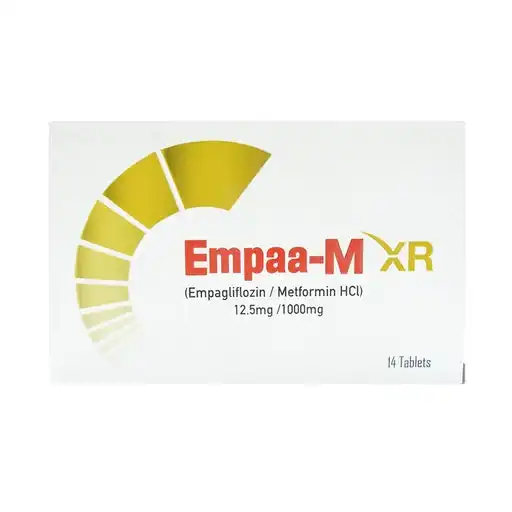
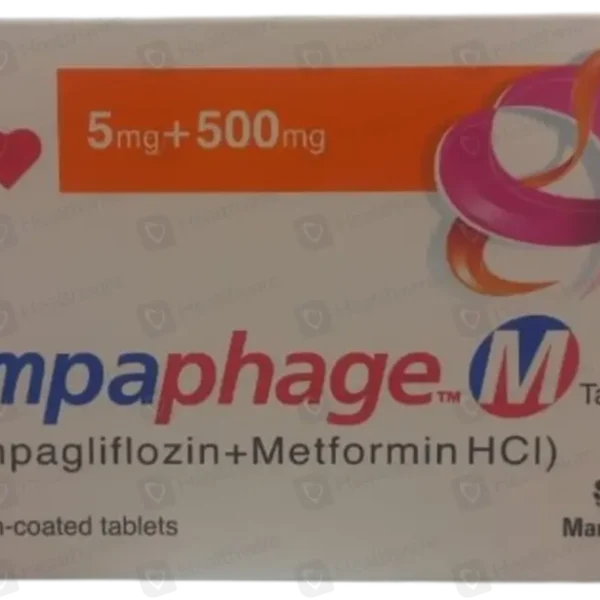
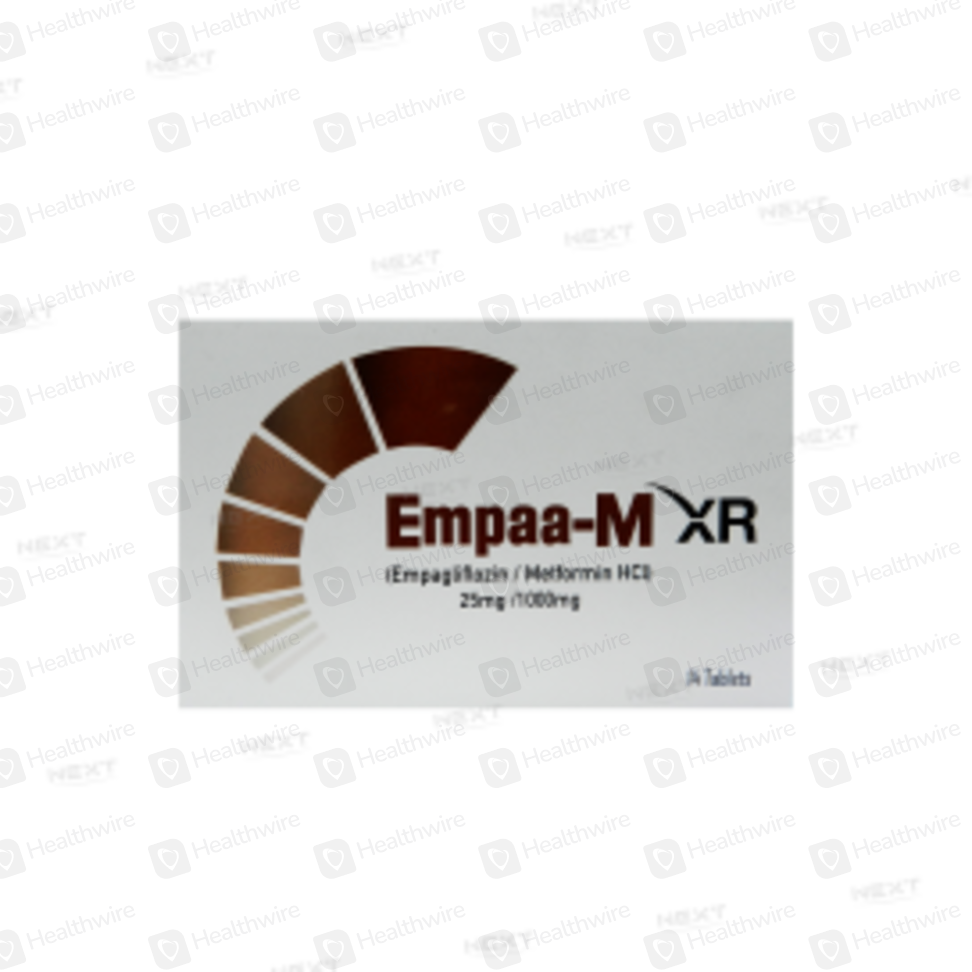





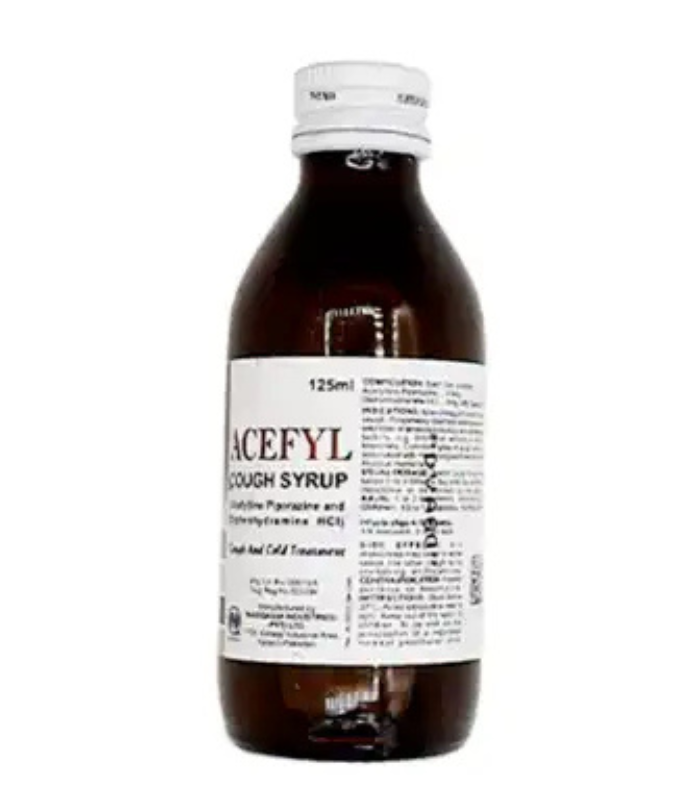
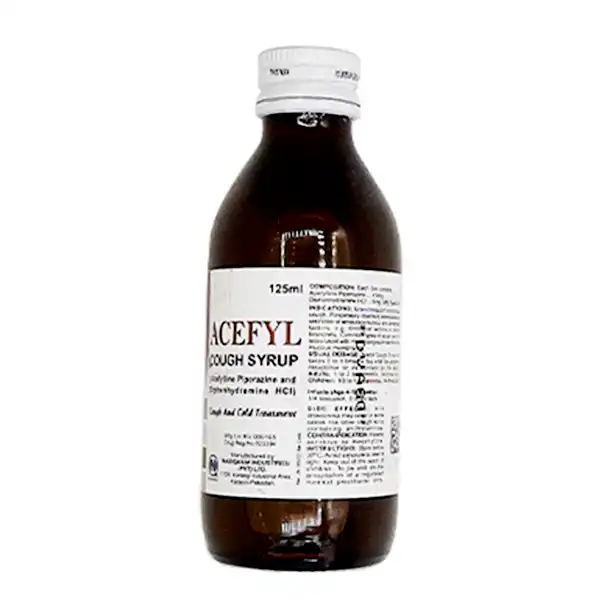
Reviews
Clear filtersThere are no reviews yet.